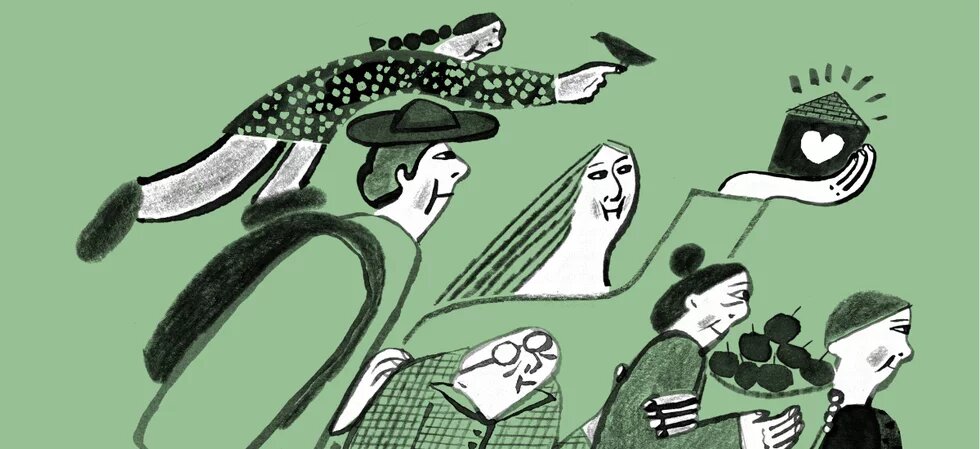Ukrainian women have become indispensable to national defense and resilience, rapidly transforming the country's legal and institutional gender framework, as well as performing many male-dominated professional roles. However, to translate this progress into sustainable security and equitable recovery, international partners must move past performative aid and directly fund local women's organizations who are carrying the state's burden of implementation while facing structural exclusion from high-level decision-making.

As the Women, Peace and Security (WPS) agenda approaches its 25th anniversary, its application in Ukraine demands a critical re-evaluation that challenges persistent Western stereotypes. For too long, Ukraine – and by extension, the whole of Eastern Europe – has been viewed as a highly patriarchal, undeveloped region struggling to grasp gender equality. As prominent Ukrainian feminist Maria Dmytriyeva argues, this cultural lag in Western perception ignores the country’s profound policy commitment and the sophisticated activism of its women.
Ukraine stands as a quiet leader of gender mainstreaming in Europe, with a political commitment rooted in history laid by pioneers like Natalija Kobrynska, Lesya Ukrayinka and Olha Kobylanska in the 19th century. Early milestones include the Society for Assistance to Higher Women's Education in Kharkiv (1840) and the Ruthenian (Ukrainian) Women's Association (December 8, 1884). This long tradition supports Ukraine's modern policy commitment. Ukraine is the only state that commenced WPS implementation before an international armed conflict (Russia’s war in 2014) has ended. The first National Action Plan (NAP) for UN SCR 1325 was approved in 2016. Despite the full-scale war, Ukraine will present its third NAP by the end of the year.
The practical success of the WPS agenda in Ukraine has been twofold: facilitating women’s visible participation in national defense and rapidly strengthening the legal and institutional framework to prevent domestic violence and prosecute war crimes against women. This policy momentum is, however, critically offset by the failure to fund women's grassroots organizations and ensure the systematic local implementation of the agenda.
Achievements: WPS Serves as a Tool for National Resilience
Ukraine has demonstrated remarkable resolve in strengthening legal and institutional frameworks. Landmark achievements include the ratification of the Istanbul Convention (June 2022) to prevent violence against women and the ratification of the Rome Statute (2024), enabling proactive justice for crimes against humanity, including conflict-related sexual violence (CRSV) committed by the Russian army. The Ukraine 5AM Coalition (30+ CSOs [civil society organizations]) and other human rights organizations professionally document these crimes, providing evidence to the International Criminal Court (ICC).
Ukraine has established a robust institutional mechanism with the national Government Commissioner for Gender Policy (Gender Ombudswoman) and regional representatives. This decentralized approach operationalizes the WPS agenda via regional action plans tailored to each oblast. The development of the third NAP (2026-2030) is a positive outcome of multi-stakeholder collaboration, led by the Ministry of Social Policy engaging diverse women's rights organizations, ensuring the plan is informed by women’s rights organization’s expertise.
Women’s organizations were among the first to provide humanitarian aid. A prominent human rights defender, Lyudmyla Yankina, for instance, arranged the delivery of twenty five tons of sand to protect the Kyiv blood donation station in March 2022. Women’s organizations are now back to promoting rights and empowerment, organizing targeted trainings for local women’s organizations. The 1325 Coalition launched the national communication campaign ‘1325 Strengthens the Country’ in September 2025. The campaign aims to raise awareness regarding the vital role women play in reconstruction, security, and decision-making, as well as in combating violence against women, developing community economic resilience, and fostering safe, inclusive environments. Importantly, the campaign targets local authorities to achieve effective implementation of the WPS and genuine societal internalization.
Challenges: Implementation Issues and the Cultural Lag
While government’s and women CSOs actions are commendable, considerable challenges remain in implementation by local authorities, the lack of funding for women’s organizations and different societal understanding of women's rights.
The International Aid Paradox
The most profound operational challenge is the lack of sustainable financial support and trust from international donors toward grassroots women’s organizations. These local groups operate in unsafe areas with the best contextual knowledge, yet statistically suffer greater funding scarcity, forcing them to perform critical, often unpaid labor. International organizations often receive disproportionately higher head-office payments, lacking local context compared to under-resourced women organizations – a fiduciary failure diverting resources from effective frontline responders.
Structural Exclusion From Policy-Making
Despite the collaborative process for the NAP, cooperation between government implementors and women's rights organizations remains challenging. Consultations with state authorities are often more formal and performative, failing to substantively incorporate evidence-based recommendations. Additionally, negotiations on sovereignty and security continue to be largely conducted without women politicians, made by majority-male teams, representing a complete structural exclusion from the highest levels of decision-making.
Inconsistent Local Implementation
The decentralized Gender Ombudswoman office is a theoretical success, but local WPS efficacy is inconsistent. It is heavily dependent on the individual persona, workload, and expertise of the regional representative. Reliance on personal willpower, rather than systematic professional engagement, leads to variable outcomes and performance gaps. Local authorities often do not prioritize WPS, withholding even scarce allocated funds. This puts pressure on women’s organizations, forcing them to educate local actors on the basics – that WPS is relevant now and will be for future peacebuilding and inclusive reconstruction. It also reinforces the practice that civil society has to carry the authorities’ responsibilities to support vulnerable populations.
The Protection Gap
Protection requires creating a safe society where victims are believed.
The critique that Ukraine is undeveloped is demonstrably false when looking at the legal framework and so many roles women perform defending Ukraine, volunteering, being bread-winners in various labor sectors, including male-dominated, i.e., engineering, truck driving, policing, as well as caring for children and the elderly. Still, not everyone is on board with women as equal participants in society and cultural norms are only slowly shifting. Recent public cases illustrate this worrying disconnect. The allegations of domestic violence against a popular actor revealed disturbing victim-blaming on social media. Similarly, actors and students spoke up about sexual harassment in the theatre community; though no formal prosecution occurred, educators resigned but remain accepted in the art community. These incidents, where victims are gaslighted and perpetrators face partial justice, prove Ukraine needs some time to combat cultural norms. Protection requires creating a safe society where victims are believed. A promising trend is that women are now less afraid to speak up.
Relief and Recovery Gaps: Overwhelmed Survivor Support
State and civil society are committed to accountability for CRSV and war crimes. However, the state does not prioritize victims’ support. CRSV victims, often facing displacement, require complex, long-term psychological, medical, financial, and legal help. Programs lack the necessary systematic approach. This responsibility falls disproportionately on women's organizations, creating a critical gap in the WPS Relief and Recovery pillar.
The Critical Lens: Intersectionality and Localization
The complexity of the war demands an intersectional approach that recognizes the diverse experiences of Ukrainian women. We must argue against viewing "Ukrainian women" as a homogeneous group. The groups that need more attention include:
- Women with disabilities: They face specific barriers in evacuation, accessing relevant aid, and suitable housing.
- Older women: They face mobility challenges, poverty in displacement due to small pensions and lack of tangible financial support, and are often disproportionately left behind in occupied or frontline territories, making them extremely vulnerable.
In contrast to national and international policy gaps, localization has proven to be a major success. Organizations like the Ukrainian Public Health Foundation have conducted safety and security audits of shelters and transport. These audits assess street lighting, the accessibility of air-raid shelters, and the safety of public and school transport. Thanks to a cooperation with the Gender Ombudswoman, these audits are then passed on to government entities. This demonstrates that shifting resources to local, women-led organizations delivers immediate, tangible results. Yet, four years into the full-scale war, state responses remain slow. Many highly populated districts still do not have sufficient air-raid shelters or any in close proximity.
Policy Recommendations for International Partners and the Government
To build on the considerable progress that Ukraine has already made and ensure that sustainable security and peace are eventually possible, the following actions are crucial:
- Mandating Sustainable Women and Feminists Grassroots Funding: International donors must ringfence a minimum percentage of aid for direct, flexible, and sustained funding to local Ukrainian women’s rights organizations, rather than to humanitarian organizations only. This must include simplified reporting requirements that recognize and trust their contextual expertise, prioritizing local women organizations over large international intermediaries, general humanitarian CSOs or top and well-established national women’s rights organizations, for on-the-ground implementation.
- Gender-Responsive Reconstruction Mandates: Donors providing reconstruction funds should mandate and monitor women’s equal participation from the state in planning and require explicit allocation of funds toward gender-specific infrastructure and livelihood programs.
- Holistic CRSV Survivor Support: Establish dedicated, fully-funded, and systematically integrated mechanisms to provide long-term, holistic support for all CRSV victims from the beginning of the war in 2014 – covering complex psychological, medical, financial, and legal needs currently imposed on civil society capacity, when states do not prioritize the issue.
- Enforcing Substantive Participation: The Ukrainian Government must formalize mechanisms to ensure the mandatory, substantive inclusion of women’s rights experts in all high-level peace, security, and recovery planning commissions, and commit to institutionalizing feedback loops to integrate CSO recommendations into state policy, moving past performative consultations.
Supporting Ukrainian women peacebuilders is not merely a gender issue – it is a core component of sustainable European security.
Ukraine is the ultimate test case for the WPS agenda – demonstrating its successes in rapid policy adoption and enabling women's visible participation in national defense, advocacy and gender-shifts in various labor sectors, but simultaneously still being slow in implementing the Women, Peace and Security Agenda on the ground. On the 25th anniversary of Resolution 1325, the challenge is clear: we must move past the perception of Ukraine as a nation struggling with patriarchal baggage. We must acknowledge its women’s active societal position and modern legal frameworks, while confronting some internal cultural pushback and the structural failure to include women in high-level decision-making spaces. Supporting Ukrainian women peacebuilders, grassroots activists and advocates is not merely a gender issue; it is a core component of sustainable European security and a necessary measure to ensure that future recovery is just and equitable.

